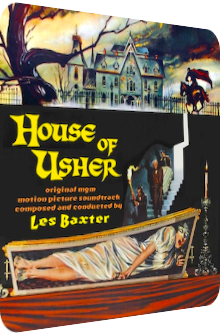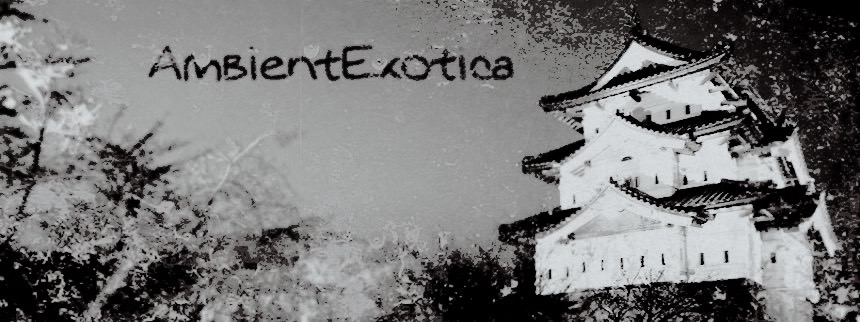
Les Baxter
House Of Usher
1960
“We heard her first feeble movements in the coffin … we had put her living in the tomb.” This excerpt from Edgar Allan Poe’s infamous short story The Fall Of The House Of Usher (1839) gives a good hint of where this review is going: even though it is ultimately about Exotica luminary Les Baxter (1922–1996), the following work falls into another category (you don’t say). Baxter had a prolific career as a composer for movie scores, most of them unintendedly hilarious B-movie flicks. Director Roger Corman’s House Of Usher falls into the latter category, but is a surprisingly great picture whose impetus has only grown over the years, be it due to the colorful sets, cob-webbed decorations or one Vincent Price who stars in this first of many more Poe films to come, all of them envisioned, realized and adapted by Corman.
House Of Usher is theatrically released in 1960 and should be of interest to Space-Age fans. The movie itself is a clear-cut horror tale about the Madeleine Usher, the sister of Roderick Usher. The girl is the fiancée of nobleman Philip Winthrop. When he wants to take his bride-to-be with him, Usher won’t let her go. He says that the bloodline of the Usher family is cursed; a horrible truth reaches to the surface. The movie slightly differs from the original plot, but is nonetheless exciting. Les Baxter aurally paints a fitting web with his fully equipped orchestra of violins and lutes, timpani and drums, harps and harpsichords. The overall cohesion and quality of the soundtrack is so enthralling, the superimposition of horror and false amicability so successfully transfered that the work is of great value even to those who only reside in the composer’s exotic realms and otherwise despise horror films. It has been twice reissued and remastered by the Oakland, California-based Intrada label in 2011 and 2014 respectively, and granted, creepiness and shocking revelations have never sounded so immediate and immersive. They demand a closer look, and I willfully obey.
In the world of Exotica, technicolor usually translates into flamboyancy and vivacity, but when Les Baxter’s Overture and Roger Corman’s gouache rivulets hits the listener at the same time, uneasiness ensues; yes, all the colors of the rainbow transpire, entangle and ooze, but the dramatic pompousness, while being in sync with the desiccate percolation, opens the gate to a withdrawn Gothic castle. The following Main Title interpolates the creepiness and pours it into a gorgeously downwards-spiraling superset of magenta strings, a delightful contrapuntal pillar to hold onto. However, once Madeline’s Brother appears, Baroque timbres become the dominant force: adamant harpsichords of portent are intertwined with viscidly glistening harps. Adjacent to this textural array is a dark piano whose staggering keys both delineate Vincent Price’s envious character and foreshadow the horrible entombment that is about to unfold. By comparison, the theme of Madeline Usher is more auroral, at least on the string level. The melodies and harmonies themselves are stern and evoke the feeling of desperation and an enigmatic bond between the caretaker and his possession.
From this point onwards, all principal themes and persona-related motifs are established and firmly in place. That these melodies and variations thereof are resurrected time and again is strikingly ghoulish in the given prospect. Most important in terms of Les Baxter’s craftsmanship is the flow that is rarely ever disturbed. Tormented, for instance, connects seamlessly to the previous compositions and enchants via cryptic claves that sound like caustic driblets of a chlorotic cavern; within their nexus lies a helicoidal void of aerose strings which is once more supercharged with diffractive dualities and demonic hints. There is only one song that breaks said flow or coherence, and that is Roderick Usher’s Lute Song. It works in the movie itself, for what else are you supposed to do in a humongous jinxed castle that is hit by nocturnal storms? You play the lute, sure, but neither is it a bonfire ditty nor does an accompaniment of orchestral strings enlighten the discordant licks. The silence becomes a much greater and more threatening force in this lute arrangement. This is curiously enough the least tense scene in the movie, but certainly a frightening affair in detached form.
Afterwards, Baxter’s compositions continue to encapsulate a wondrously mellow-dangerous stringency, whether it is in the glacial-galactic The Vault with its mellifluously screeching string cataracts and dangerously innocent jungle flutes, the majestic – though for the wrong reasons – House Of Evil and the remembrance of the twisted cruelties that are perversely transfigured by lascivious woodwinds and a mélange of legato washes, or finally through the utmost apocalyptic endpoint Fall Of The House Of Usher with its thirteen minutes of rufescent brass stabs, recurrent lute rhizomes and violent violins.
House Of Usher is a magnificent soundtrack that leads a life of its own once it is detached from the similarly great horror flick. While it is a B-movie alright, Roger Corman’s first entry in the Poe series enchants with comparatively detailed sets, decorations and ornaments that outgrow the razer-thin budget and make for a great backdrop in which Vincent Price can act, react and re-enact as he pleases. I happen to adore said Poe cycle, but can wholeheartedly relate to people’s hesitation, whether it arises due to this being a movie of the horror genre, or because of the presumed cheap thrills. Heck, maybe Mr. Price himself is the reason, and who am I to convince people of his genius? There is one relevant thing I can advertise, though, and this is the whirling string-fueled concoctions of Les Baxter.
The soundtrack remains tightly grafted onto the sequence of events qua the nature of being a soundtrack in the first place, but the hooks, aural vestibules and returning fugues cannot be elbowed away. They lure the listener with their dichotomy of terror and benignancy. The simultaneity of decay and debris on the one hand and genuine excitement, even lush segues, make for a great joyride throughout the album. The pristine quality of the remastered reels adds much to the atmosphere. One hasn’t experienced Les Baxter’s cinematographic orchestra like this before, and even the best possible copy of the movie or supposed remastered versions thereof won’t feature the solemn oomph, the powerful force of the cascading string vortices. House Of Usher is available on CD, a download version and on streaming services.
Exotica Review 457: Les Baxter – House Of Usher (1960). Originally published on Oct. 31, 2015 at AmbientExotica.com.
